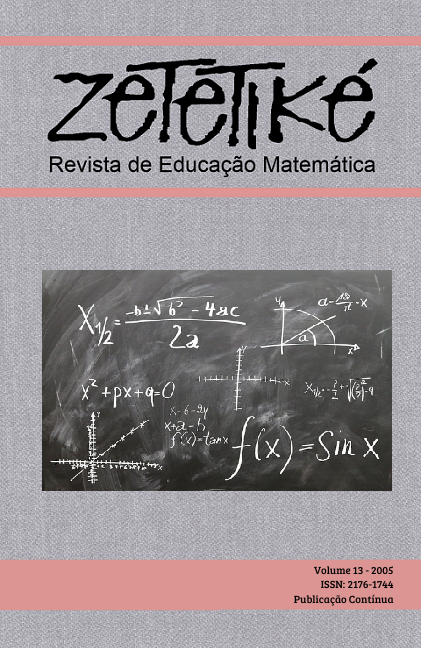Abstract
A maioria das investigações em etnomatemática tem demonstrado que existem várias formas culturais de matemática diferentes da matemática dominante. Atualmente, a maioria das pesquisas em etnomatemática está voltada para um estudo etnográfico ou antropológico dos grupos culturais. Por outro lado, existe uma grande necessidade de que o Programa Etnomatemática seja identificado como um programa que busca as práticas de ensino-aprendizagem direcionadas à ação pedagógica. O grande desafio para os pesquisadores em etnomatemática é elaborar estudos e práticas pedagógicas que estejam de acordo com os objetivos filosófico-teóricos deste programa.
References
ABRAHAM, J.; BIBBY, N. Mathematics education and society: Ethnomathematics and a public educator curriculum. Learning of Mathematics, 8(2), p. 2-11, 1988.
ABREU, G. O. O uso da matemática na agricultura: O caso dos produtores de cana de açúcar. Dissertação de Mestrado não publicada. Recife: UFPE, 1998.
ASCHER, M. Ethnomathematics: A multicultural view of multicultural ideas. Pacific Grove: Brooks-Cole Publishing, 1991.
BAGERT-DOWNS, R. L.; KULIK, J. A.; KULIK, C. C. Effectiveness of computerbased education in secondary schools. Journal of Computer-Based Instruction, 12(3), p. 59-68, 1985.
BARTON, B. Making sense of ethnomathematics: Ethnomathematics is making sense. Educational Studies in Mathematics, 31, p. 201-233, 1996.
BISHOP, A. J. Cultural conflicts in mathematics education: Developing a research agenda. For the Learning of Mathematics, 14(2), p. 15-18, 1994.
BORBA, M. C. Etnomatemática e a cultura em sala de aula. A Educação Matemática em Revista, 1(1), p. 43-58, 1993.
CARRAHER, T.; CARRAHER, D., CARRAHER, D. W.; SCHLIEMANN, A. D. Mathematics in the streets and in schools. British Journal of Developmental Psychology, 3(1), p. 21-29, 1985.
CLOSS, M. P. Native American mathematics. Austin: University of Texas Press, 1986.
D’AMBROSIO, U. Ethnomathematics and its place in the history and pedagogy of mathematics. For the Learning of Mathematics, 5(1), p. 44-48, 1985.
D’AMBROSIO, U. Etnomatemática. São Paulo: Ática, 1990.
D’AMBROSIO, U. Curso virtual de etnomatemática. Etnomatemática na Universidade Virtual Latino-Americana, 1998. Disponível em http://vello.sites.uol.com.br/aulas.htm.
D’AMBROSIO, U. Alustapasivistykselitys or the name ethnomathematics: my personal view. São Paulo, 2002. Artigo não publicado.
D’AMBROSIO, U. Ethnomathematics: my personal view. São Paulo, 2004. Artigo não publicado.
DOWNEY G. L.; LUCENA, J. Weeding out and hiring in: How engineers succeed. In: DOWNEY, Gary Lee; DUMIT, Joseph (eds.). Cyborg & Citadels: Anthropological Interventions in Emerging Sciences and Technologies. Santa Fe, N. M: School of American Research Press, 1997.
EGLASH, R. When math worlds collide: Intention and invention in ethnomathematics. Science, Technology and Human Values, 22(1), p. 79-97, 1997.
EGLASH, R. African fractals: Modern computing and indigenous design. New Brunswick: Rutgers University Press, 1999.
EGLASH, R. Computation, complexity and coding in Native American knowledge systems. In: HANKS, Judith (ed.). Native American Mathematics. NCTM, 2000.
EGLASH, R. Learning ethnomathematics: A software environment for teacher profession development and students’ classroom use. Projeto em desenvolvimento não publicado. 2002.
FREIRE, P. Pedagogia do Oprimido. Rio de Janeiro: Paz e Terra. 1970.
GEARY, D. C. Children’s Mathematical Development: Research and Practical Applications. Washington, DC: American Psychological Association, 1994.
GERDES, P. On Possible Uses of Traditional Angolan Sand Drawings in the Mathematics Classroom. Educational Studies in Mathematics, 19(1), p. 3-22, 1988.
GERDES, P. Etnomatemática: Cultura, Matemática, Educação. Maputo: Instituto Superior Pedagógico, 1991.
GERDES, P. On culture, geometrical thinking and mathematics education. In: POWELL, A. B.; FRANKENSTEIN, M. (eds.). Ethnomathematics: Challenging Eurocentrism in Mathematics Education. Albany, NY: State University of New York Press, p. 223-247, 1997.
GERDES, P. Ethnomathematics as a new research field, illustrated by studies of mathematical ideas in African history. In: SALDAÑA, Juan Jose (ed.). Science and Cultural Diversity: Filing a gap in the history of sciences. Cuadernos de Quipu 5, Sociedad Latinoamericana de Historia de las Ciencias y Technologia, p. 10-34, Mexico, 2001.
GILMER, G. Mathematical patterns in African-American hairstyles. Artigo disponível online em http://www.math.buffalo.edu/mad/special/gilmergloria_HAIRSTYLES.html. Consultado em 1999.
HALE-BENSON, J. Visions for children: African-American early childhood education program. ED 270235, 1995.
HANKES, J. E. Native American Pedagogy and Cognitive-Based Mathematics Instruction. New York: Garland Pub, 1998.
JOSEPH, G. C. The crest of the peacock: Non-European roots of mathematics. London: I.B. Taurus, 1991.
KNIJNIK, G. Educação matemática, exclusão social e política do conhecimento. Bolema, 14(16), p. 12-28, 2001.
LAVE, J. Cognition in practice. Cambridge, England: Cambridge, 1988.
NUNES, T.; SCHLIEMANN, A. D.; CARRAHER, D. W. Street mathematics and school mathematics. Cambridge: Cambridge University Press, 1993.
OREY, D. C. The ethnomathematics of Sioux tipi and cone. In: SELIN, H. (ed.). Mathematics across cultures: the history of non-western mathematics. Norwell: Kluwer Academic Publicares, p. 239-253, 2000.
ROSA, M. From reality to mathematical modeling: A proposal for using ethnomathematical knowledge. Tese de mestrado não publicada. California State University, Sacramento, CA, USA, 2000.
ROSA, M.; SILVA, C. M.; BERALDO, R.M. N.; VIALTA, R.; DEL CONTI, M. I. A. Café: modelagem matemática e etnomatemática. Monografia de especialização não publicada. PUC, Campinas, 1999.
SAXE, G. Candy selling and math learning. Educational Researcher, 17(6), p. 14- 21, 1988.
VITHAL, R.; SKOVSMOSE, O. The end of innocence: A critique of ethnomathematics. Educational Studies in Mathematics, 34, p. 131-147, 1997.
WARSCHAUER, M. Electronic literacies: language, culture, and power in online education. Mahwah, N.J.L. Erlbaum Associates, 1999.
WITHERSPOON G., PETERSON, G. Dynamic symmetry and holistic asymmetry in Navajo and western art and cosmology. Bern and New York: Peter Lang Publishing, 1995.
ZASLAVSKY, C. Africa counts: Number and patterns in African culture. Boston: Prindle, Weber & Schmidt, 1973.

This work is licensed under a Creative Commons Attribution-NonCommercial-NoDerivatives 4.0 International License.
Copyright (c) 2014 Zetetiké: Revista de Educação Matemática

